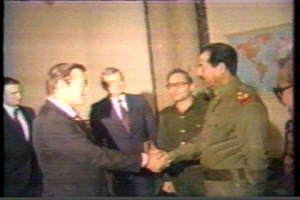They kill us when they are friends. They kill us when they are enemies!
Principles of the Nuremberg Tribunal, 1950
Send War-Criminals to Jail!
Bush & Blair
Saddam Hussein
all of them!

Right: Iraqi President Saddam Hussein greets
Donald Rumsfeld, then special envoy of
President Ronald Reagan, in Baghdad
on December 20, 1983.
U.S. DOCUMENTS SHOW EMBRACE OF SADDAM HUSSEIN IN EARLY 1980s
DESPITE CHEMICAL WEAPONS, EXTERNAL AGGRESSION, HUMAN RIGHTS ABUSES
Fear of Iraq Collapse in Iran-Iraq War Motivated Reagan Administration Support;
U.S. Goals Were Access to Oil, Projection of Power, and Protection of Allies;
Rumsfeld Failed to Raise Chemical Weapons Issue in Personal Meeting with Saddam
Read more...
La poignée de mains Donald Rumsfeld-Saddam Hussein
Journal pour l'indépendance, le féminste et le socialisme lundi 3 mars 2003
Saddam Hussein, Donald Rumsfeld, and the Golden Spurs
JEREMY SCAHILL: An article came out in the New York Times on August 18 detailing what it calls an American covert program during the 1980s that helped Iraq plan battles at a time when U.S. intelligence indicated Iraq would use chemical weapons against Iran. This follows my article on August 2 called The Saddam in Rumsfeld's Closet, in which I wrote about the relationship between Saddam Hussein and Donald Rumsfeld, the current U.S. Defense Secretary. You have to go back some 20-plus years, to a time when Ronald Reagan was president and the Iran-lraq war was escalating dramatically. The United States was giving aid and weapons to both Iran and Iraq with the understanding, as Henry Kissinger put it, "that it's best to let them kill each other off," and, "oil is too valuable a commodity to be left in the hands of the Arabs."
The Saddam in Rumsfeld's Closet!
Saddam key in early CIA plot
U.S. forces in Baghdad might now be searching high and
low for Iraqi dictator Saddam Hussein, but in the past
Saddam was seen by U.S. intelligence services as a
bulwark of anti-communism and they used him as their
instrument for more than 40 years, according to former
U.S. intelligence diplomats and intelligence officials.
By Richard Sale UPI Intelligence Correspondent From the International Desk
Timeline: Iraq war: Origins of conflict
...
February 1963: A CIA-assisted coup sweeps Qassim from office, and he is summarily shot.
July 1968: The Ba'athist regime—that which empowered Saddam Hussein - takes control in a
bloodless coup.
June 1, 1972: The Ba'athist government grabs the remainder of IPC's assets in Iraq, except for
IPC's interests in Basrah Petroleum which the government took over in 1975. At the time of the
nationalization, the ownership structure was essentially the same as it was in the 1920s: Exxon,
Mobil, BP, and Total.
May 1981: State Department official Thomas Eagleton meets with Iraqi Deputy Prime Minister
Tariq Aziz, and signals a thaw in U.S.-Iraqi oil business relations.
August 13, 1981: Iranian news agency reports that Iraq used chemical weapons in a mountain
pass battle.
March 1982: Syria, pledging solidarity with Iran, closes a major oil export pipeline from Iraq.
1983 to 1988: Iraqi planes drop at least 13,000 chemical bombs.
October-November 1983: Iranian government cites several Iraqi air and ground chemical attacks.
December 2, 1983: State Department invites Bechtel officials to discuss a new oil pipeline to run
from Iraq to the Gulf of Aqaba, Jordan.
December 20, 1983: President Reagan's special Middle East envoy, Donald Rumsfeld, meets with
Aziz and Hussein in Baghdad. Much talk revolves around the Bechtel pipeline proposal. No
mention is made of any discussion of weapons of mass destruction, despite Iraq having allegedly
used them in recent weeks.
January 14, 1984: Secretary of State George Shultz considers "virtually all sales of non-munitions list dual use equipment to Iraq," and adds, "there are recent reports that Iraq is giving priority to pursuing an Aqaba pipeline as an additional oil export outlet."
February 29, 1984: Bechtel executive notes that "the State Department has exerted strong
pressure on Ex-Im to make additional credits available [in Iraq], including for this pipeline."
...
How Oil Interests Obscured US Government Focus On Chemical Weapons Use by Saddam Hussein
Robert Fisk:
Nej, gällde det massförstörelsevapen skulle vi invadera Nordkorea, inte Irak. Det handlar inte om brott mot mänskliga rättigheter heller.
1983 när Irak använde gas mot iranska armén i strid med alla krigslagar och när Saddams torterare härjade i Bagdad sände Reagan ett sändebud till Bagdad för att åter öppna USA:s ambassad där. Sändebudet var samme Rumsfeld som nu gråter krokodiltårar över brott mot männniskorätten och massförstörelsevapen i Irak.
Följande år, 1984, mötte Rumsfeld Tariq Aziz, Saddams närmaste man samma dag som FN offentliggjorde sin första rapport om giftgasanvändning. Det rör sig varken om massförstörelse vapen eller mänskliga rättigheter. Det handlar främst om det som Nordkorea inte har - olja.
An interview with Robert Fisk - Swedish Television
Find more articles on the Web: Saddam USA CIA WAR & WEAPONS
